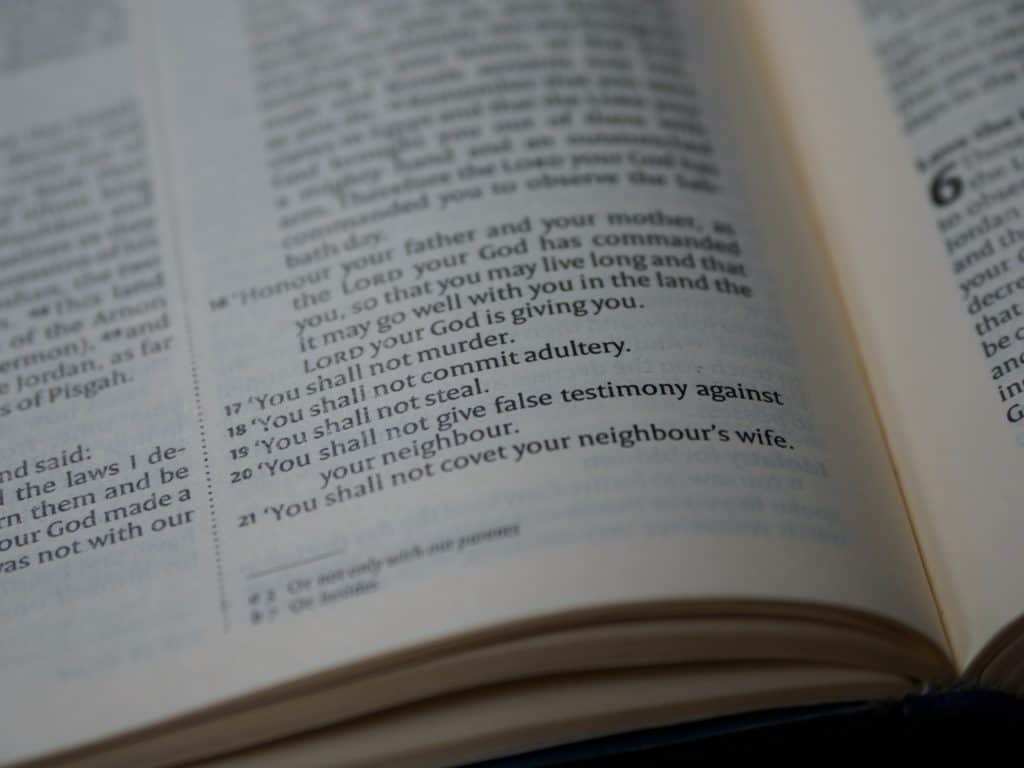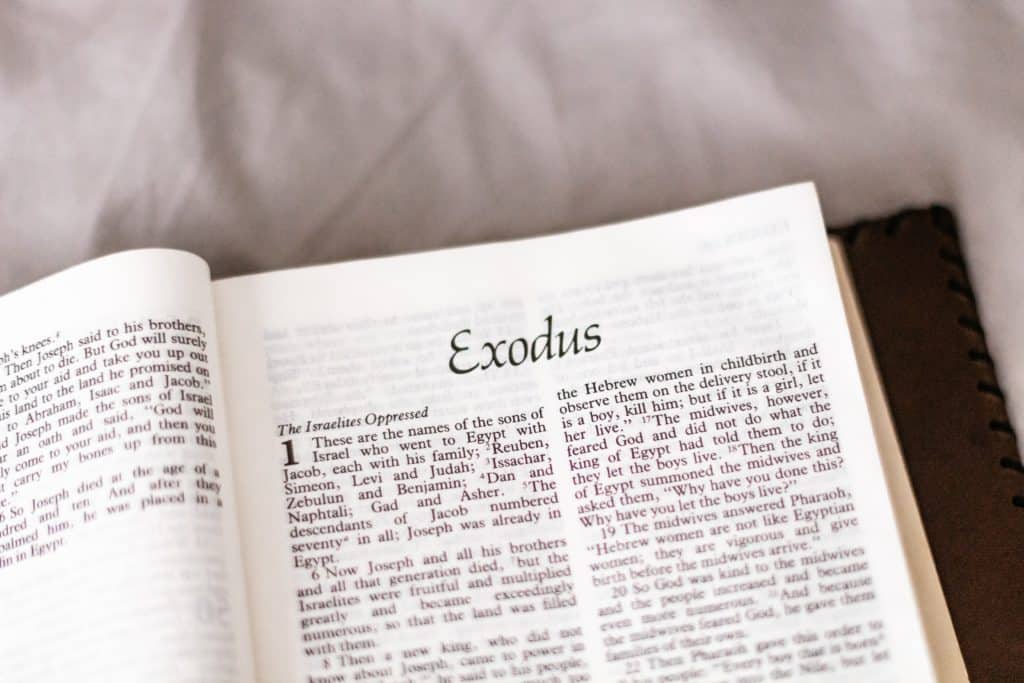The Law of God is also referred to as the “decalogue,” “God’s Law” or “The Ten Commandments.” In some places you might see them displayed on signs, murals or sculptures in yards, on church walls, or on statues and buildings.
They are some of the oldest moral guidelines known to man. The law of God was first written down in the Old Testament of the Holy Bible.
These 10 commandments are found in Exodus 20 and have served as a moral blueprint for humanity to live a life of freedom, respect and virtue for many generations.
The first few commandments help us maintain a healthy relationship with God, and the rest guide our relationships with other humans. They are a way for humanity to express our devotion and obedience to God, and a way for God to express His will and character to us.
To learn more about the Law of God, we will cover:
Belief 19: The Law of God
The great principles of God’s law are embodied in the Ten Commandments and exemplified in the life of Christ. They express God’s love, will, and purposes concerning human conduct and relationships and are binding upon all people in every age. These precepts are the basis of God’s covenant with His people and the standard in God’s judgment. Through the agency of the Holy Spirit they point out sin and awaken a sense of need for a Saviour. Salvation is all of grace and not of works, and its fruit is obedience to the Commandments. This obedience develops Christian character and results in a sense of well-being. It is evidence of our love for the Lord and our concern for our fellow human beings. The obedience of faith demonstrates the power of Christ to transform lives, and therefore strengthens Christian witness. (Exod. 20:1-17; Deut. 28:1-14; Ps. 19:7-14; 40:7, 8; Matt. 5:17-20; 22:36-40; John 14:15; 15:7-10; Rom. 8:3, 4; Eph. 2:8-10; Heb. 8:8-10; 1 John 2:3; 5:3; Rev. 12:17; 14:12.)
Where did the Law of God come from?

The story of Moses journeying up Mt. Sinai and receiving the Ten Commandments from God is found in the Bible in the book Exodus, and reiterated in the book of Deuteronomy. At this time the Israelite people were in the desert after being enslaved in Egypt.
This large group of men, women, and children needed order and leadership after enduring hundreds of years in slavery. Many of them were born and raised as slaves to Egypt, knowing no other life.
While in the desert seeking the promised land, the Israelites leaned into their sinful nature. So when Moses met with God on Mt. Sinai, it was time to put God’s law in writing.
After God inscribed His commandments on two stone tablets, Moses brought them down to the Israelites
Exodus 20 explains the Ten Commandments, clearly written out so God’s followers could have a clear picture of His will and expectations for His people.

The first 4 commandments have to do with our relationship with God.
1. Do not have other gods before Me (Exodus 20:3).
This means nothing and no one should be worshipped above God.
Worshiping anything or anyone other than the one true God is a violation of this commandment. Idolizing celebrities, preachers, politicians, religious leaders, or any other human or god is putting other gods before the Almighty God.
2. Do not make idols, bow down to them, or serve them (Exodus 20:4).
This means we shouldn’t create gods or idols to worship or serve.
Many addictions we experience on earth can become a god to us. Today Christians may struggle with putting electronics, work, money, and even relationships above God. We can keep things of importance to us, while also keeping God and our relationship with Him at the top of our priorities.
3. Do not take the name of the Lord in vain (Exodus 20:7).
This means we shouldn’t use the Lord’s name unless we are genuinely speaking to Him or about Him.
Swearing or cursing with God’s name, or claiming to do something in God’s name that in reality is self-serving, are ways of using His name in vain. His name should be used reverently and with honor. If you speak to or about God, it should be to honor Him or teach about Him.
4. Remember the Sabbath day to keep it holy (Exodus 20:8).
This means we should observe the Sabbath day, remember why God made it, and teach the Sabbath to our children so they also remember it.
Today, many choose one day of the week to attend church and have family activities. It’s important to note the word remember in the fourth commandment. The Sabbath day is to be remembered as the seventh-day of the week. On this day we should not only attend church, but worship God throughout the day, commune with Him, fellowship with other Christians, and do God’s good work. It is something to be treasured and enjoyed!

The last six commandments have to do with our relationship with other people.
5. Honor your father and mother (Exodus 20:12).
This means we should respect our father and our mother.
Keeping the fifth commandment is about preserving your relationship with your earthly parents. This looks like obedience and respect, but can look different when they are unjust, abusive, or un-Christian. You can still honor and respect your parents in words and in communication as well as heeding their advice while choosing another path.
6. Do not murder (Exodus 20:13).
This means we should protect and preserve human life, never taking the life of another.
Deliberately killing another human being is a violation of the sixth commandment. As God is the giver of life, killing another is a perversion of His creation. While causing any death may not be a violation of the commandment, the intention behind the death most definitely matters. An accidental death, for instance, versus a premeditated crime that resulted in death–both ended human life, but only one intended harm.
7. Do not commit adultery (Exodus 20:14).
This means we should respect marriage, keeping our marriage vows, and not interfere in the marriage of another.
The seventh commandment is about showing respect for your relationship and marriage vows, your body, and the body of your spouse. Sexual relations with someone other than the person you’re married to is adultery, but it goes beyond that. Adultery can include any non-platonic behavior with another person who is not your spouse, as well as emotional attachment.
8. Do not steal (Exodus 20:15).
This means we should respect the property of others. We will not take it for ourselves or keep it without permission.
Taking something that doesn’t belong to you, regardless of your personal situation, is a violation of the eighth commandment. If you take or use something that belongs to anyone else, you should first ask permission. If they don’t grant permission, it is stealing.
9. Do not bear false witness against your neighbor (Exodus 20:16).
We should never make false accusations or dishonestly mar the reputation of another.
Acting dishonestly, trying to make another person look bad, or even misrepresenting yourself, violates the ninth commandment. This could include making an accusation for which you have no evidence.
10. Do not covet (Exodus 20:17).
We should appreciate the things we have and avoid longing for the things other people have, or feeling that we are entitled to what others have.
Comparing yourself with others to the point that you feel you need to have what they have is a violation of the tenth commandment. This is about avoiding greed, and about putting trust in God to meet your needs. Letting feelings of jealousy grow within you often leads to ingratitude and eventually covetousness. Fixating on what others have can cause us to miss blessings, hurt others, or value things more than our relationship with God.
Want to learn more about God and His laws of love? Sign up for our online Bible studies.

Many humans alive today and in the past experience a “moral compass” or “natural law” that helps us know what is right from what is wrong. Many would agree that The Ten Commandments align with the moral compass we all seem to adhere, But they contain some very specific and crucial instructions. Following these commandments lead us on the path of righteousness.
Before the physical writing of the Ten Commandments of law and order for the Israelites in Deuteronomy 5, God says, “I am the Lord your God, who brought you out of the land of Egypt, out of the house of slavery” (v. 6).
Following these rules was an expression of thanksgiving for what God did then as well as what He does for us now, freeing us from the slavery of sin. God freed the Israelites from generations of hard labor and slavery in Egypt. He frees us now from the bondage of sin and the eternal consequences of it.
The Bible tells us “For the wages of sin is death, but the free gift of God is eternal life in Jesus Christ our Lord” (Romans 6:23, ESV).
After listing God’s law, in Deuteronomy 6, Moses tells the Israelites to “love the Lord your God with all your heart and with all your soul and with all your might” (v. 5).
Jesus says something similar in Matthew 22 when the Pharisees asked which is the greatest commandment of the Law:
“You shall love the Lord your God with all your heart and with all your soul and with all your mind.
This is the great and first commandment. And a second is like it:
You shall love your neighbor as yourself. On these two commandments depend all the Law and the Prophets” (Matthew 22:37-40, ESV).
These two great commandments are the ten laws summed up. The first four are a reflection of our love for God. The following six have to do with loving God’s people, our neighbors.
While in a relationship with God, keeping the commandments is an expression of our love and devotion to Him. Keeping the commandments will help us grow in our relationship with God and maintain stable relationships with the rest of humanity.
God’s love is written in the law.

What is the Purpose of God’s Law?
The purpose of God’s law is to protect us from the pain of sin, and the downfalls of selfishness. The decalogue creates a pattern of living that leads to righteous actions, thoughts, and relationships.
On earth there are consequences of sin that affect us now. Trauma, stress, divorce, loss, unhappiness, careless mistakes-—these are only some of the pain we can avoid when we keep God’s law. He wants us to be happy and whole. He wants us to be like Him, to be acceptable in His sight.
The Law that has been passed down from generation to generation and then recorded in the Bible is important to us as Adventists and as Chistians. The commandments show us God’s character and love.
Each commandment shows us that:
- God values human life (Exodus 20:13)
- God values relationships (Exodus 20:12-17)
- God values our belongings (Exodus 20:15, 17)
- God values our devotion (Exodus 20:1-8).
- God values us, and that is the most important thing to remember about the Law of God.
The Psalmist beautifully sums up the purposes of God’s direction in Psalm 19,
“the law of the Lord is perfect, reviving the soul
the testimony of the Lord is sure, making wise the simple
the precepts of the Lord are right, rejoicing the heart
the commandment of the Lord is pure, enlightening the eyes
the fear of the Lord is clean, enduring forever
the rules of the Lord are true, and righteous altogether” (v. 7-9, ESV, emphasis added).
As Seventh-day Adventists, we believe in the timeless authority of the Holy Scriptures and the unchanging God who inspired their creation. God’s Law cannot and should not be changed.
“Until heaven and earth pass away, not an iota, not a dot, will pass from the Law until all is accomplished” (Matthew 5:18, ESV).
God’s law has not and will not change, so we encourage all Christ-followers to keep all ten, with the help of the Holy Spirit who Christ sent to help His people.
But it is important to remember that it is not our own keeping of the law that cleanses us, but the Maker of the Law who cleanses us.
That brings us to the greatest purpose of God’s Law: It allows us to recognize our sinfulness and our need for Him.

The Law Points Out Sin—But Jesus is the One Who Saves Us
Law-keeping and rule-following are excellent goals for our personal lives. But those efforts alone will not give us salvation.
Focusing solely on keeping God’s law does not produce a relationship with God or a love for Him.
Imagine someone you love has a list of things they like to have done for them. You consistently do those things, and encourage others to do those things as well—but you never talk to or spend time with the person who made the list in the first place. That doesn’t sound much like a relationship, does it?
Jesus says in John 14:15, “If you love me, you will keep my commandments” (ESV).
It’s similar to the reason a married couple keeps their marriage vows. Not because they “have to,” but because they love the person they married.
For by grace you have been saved through faith. And this is not your own doing; it is the gift of God, not a result of works, so that no one may boast. For we are his workmanship, created in Christ Jesus for good works, which God prepared beforehand, that we should walk in them.
Ephesians 2:8-10
But even if we keep God’s commandments out of love, we as human beings are far from perfect. We will make mistakes.
Thank the Lord Jesus that it’s not the perfect following of God’s law that saves us, because of ourselves we cannot keep God’s law.
Rather, the law helps us learn where we fall short, and provides us with a framework of loving behavior to keep working toward.
The Bible tells us that we’re saved by grace “through faith. And this is not your own doing; it is the gift of God, not a result of works, so that no one may boast” (Ephesians 2: 8, 9, ESV).
God’s grace and Jesus’ sacrificial death on the cross are what save us from the wages of sin, which is eternal death (Romans 6:23). It is through the Holy Spirit we’re able to keep the law in our human weakness, and gain salvation through Jesus Christ.
The law does not restrict us, but rather it frees us from the traps of sin and selfishness and gives the choice to follow God’s way. And it identifies our need for a savior in Jesus Christ.

The Word Made Flesh
Adventists take the Law of God seriously, recognizing it is not meant to be a burden but a roadmap to a happier, healthier humanity.
And if we ever find it difficult to consistently keep God’s commandments, we have the example of Jesus in the Bible. His earthly life of ministry demonstrated God’s law in action.
Jesus lived out the law while on earth (John 1:1-5).
- He let nothing come between His relationship with the Father—not even His own needs. In this way He had “no other gods” before God.
- He kept the Sabbath holy (Luke 4:16), not because anyone told Him to, but because of His love of the Father (Luke 2:51).
- He honored His earthly parents and even made plans for His mother after His death (John 19:26).
- He not only endured the temptation to sin, but was sent to earth in the likeness of sinful flesh and still did not sin.
Romans 8 says, “For the law of the Spirit of life has set you free in Christ Jesus from the law of sin and death. For God has done what the law, weakened by the flesh, could not do. By sending his own Son in the likeness of sinful flesh and for sin, he condemned sin in the flesh” (v. 2, 3).
Jesus is the Word of God made flesh (John 1:14), and through Him we can see God clearer and learn from His loving example. When we keep the Law of God, we can be a witness to the rest of the world.
Ready to start Bible studies and discover Scripture for yourself?
Want to know more of how God’s laws are meant to give us freedom, hope and healing? Check out our online Bible studies.

Editorial: More than a god of the gaps
At times I have wondered about the role God plays in the world—where can we see Him at work? People…

Negotiating with the law
Red and blue lights swirled in my rearview mirror. I pulled over, and the helmeted police officer st…

Law or Love?
When they think about Christians, many people think about a lot of stifling rules. They can’t…

God’s Ten Commandments
Follow along with me on a bit of logic, if you will. The apostle John wrote that “God is love&…
